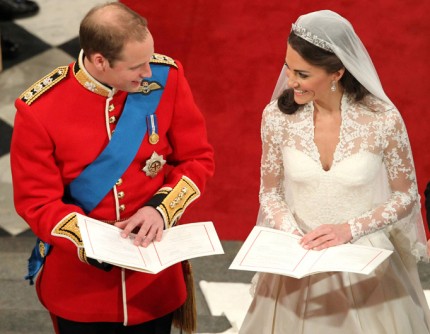Saturday, April 30, 2011
 The Royal Wedding
The Royal WeddingPrince William & Catherine Middleton
LONDON, ENGLAND - APRIL 29: Prince William exchanges rings with his bride Catherine Middleton in front of the Archbishop of Canterbury Rowan Williams inside Westminster Abbey on April 29, 2011 in London, England. The marriage of Prince William, the second in line to the British throne, to Catherine Middleton is being held in London today. The marriage of the second in line to the British throne is to be led by the Archbishop of Canterbury and will be attended by 1900 guests, including foreign Royal family members and heads of state. Thousands of well-wishers from around the world have also flocked to London to witness the spectacle and pageantry of the Royal Wedding.
Britain’s current economic situation, a $70million long bill, for a wedding that will be attended by almost 2000 guests, still seems pretty stupendous. Putting this total cost in perspective, Chelsea Clinton’s wedding in June last year cost only around $5million.
The costs for:
Security Cost: Approximately $33 million
Floral Display Cost: Around $800,000
Kate Middleton’s Wedding Dress Cost: between $300,000 to $450,000
Cake Cost: Approximately $78,000
Other Costs: $63,000
Total Costs: $70 million
The Royal Wedding and Britain’s Economy
29th April, the day when Kate and William get married, will be declared a national holiday. And, according to estimates by the Confederation of British Industry, shutting down the British economy for 24 hours for the royal wedding will cost the country $6billion, constituting the biggest cost of the event.
With U.K facing a fiscal deficit of $256-billion this year, this extra $6billion is a very dear loss for the nation.
What’s worse, the wedding falls smack bang in the middle of a string of other holidays, leaving only three working days between April 22 and May 2. As a result, many businesses are likely to stay shut through the entire 10-day period, a string of lost productivity that could remove $47-billion from economic output, according to an estimate by accounting firm RSM Tenon.
There is one small compensation though. Tourism and merchandise related to the royal wedding are likely to boost Britain’s economy by about $1billion.
 home
home



























































 Home
Home